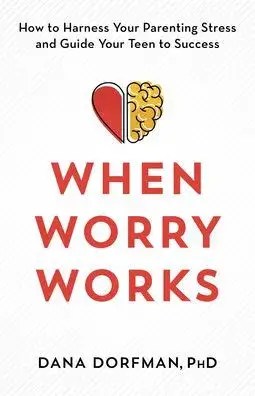
Dr. Dana Dorfman’s New Mental Health Guide For Parents: “When Worry Works”
If you’re a parent, you likely worry. This worrying may ebb and flow and change during the many stages of your child’s life.
Dr. Dana Dorfman knows this too well, having seen families over the past 30 years in her practice where she noticed the the rising cases of anxiety not only in teens, but in their parents. In addition to raising teens in NYC, her own attunement due to her academic history, and research, she wrote “When Worry Works: How to Harness Your Parenting Stress and Guide Your Teen to Success” as a way to help parents become aware of their anxieties, learn how to manage them, and empower them to make values aligned decisions, rather than worry driven ones. Read on for more to learn more about Dr. Dana Dorfman and her new book (coming out on February 13th) below:
Westchester Family:How did the idea for When Worry Works come about?
Dr. Dana Dorfman: It was a confluence of factors. There was my clinical work/observations with teens and families in my Manhattan practice, my experiences as a parent raising teens in NYC and my attunement to these issues due to my own complicated academic and achievement history.
My own history: Despite my being a deeply curious and relatively cerebral kid from a privileged and high achieving family, I academically underperformed to such an extent that I was a hair shy from not graduating or earning my high school diploma. This disconnect between my desire and my behavior was the source of great inner conflict/ dissatisfaction for me – not to mention my parents’ great disappointment!
Through research and study, I sought to understand the cultural and emotional factors which contributed to my underperformance, and sift through my corresponding shame and dissatisfaction; I was particularly focused on the systemic educational overemphasis on quantifiable metrics (like grades and test scores), narrow definitions of intelligence and success, intolerance of divergent learning styles, and widely accepted hierarchical school rankings – all of which were woven into the fabric of the rapidly intensifying achievement culture. Thus, I furthered my exploration of the intersectionality of emotions, intellectual functioning, and motivation.
Informed by my research, I was determined to raise my own children with different achievement perspectives and approaches. However, I quickly learned that my revised formula was also defective – I appreciated the dilemmas and complications parents faced. My theory was not as simple to execute in practice. These issues were even more complex and layered than I realized. I deepened my appreciation parents’ dilemmas and challenges
Simultaneously, I have been treating teens and families in NYC, a hotbed of achievement culture! Over the past 2 decades, I witnessed this phenomenon that had been so central to my psychology intensifying and playing itself out in teen after teen. Despite their superior achievement and extraordinary credentials, they seemed to lack genuine curiosity and creativity. As if the desire to learn had been expunged from them.
Many of whom appeared to be “functioning”- sometimes at superhuman levels, but were crumbling under the pressures to keep up. And these were the children of loving and well-intended parents who wanted their kids to be happy, fulfilled and satisfied. And yet the teens in my office were depressed, anxious and lost. And many were lacking some of the essential emotional tools and skills to become successful, fulfilled and independent adults. Something was getting lost in translation and I was determined to find it!
Westchester Family: Why do you think worrying gets such a bad reputation?
Dr. Dana Dorfman: Since worrying is a byproduct of anxiety and anxiety gets a bad rap, then worrying does also! We commonly pathologize anxiety as a whole – as if all anxiety is problematic. We’re often accustomed to considering it in excess- like when it interferes with functioning. However, some anxiety is helpful- it keeps us alert, on our toes, and prepared. It’s finding the sweet spot that is hard! Just the right amount to mobilize us without overwhelming or misleading us.
Westchester Family: How can worry/self-reflection help parents better understand their relationships with their kids?
Dr. Dana Dorfman: The better that we understand our inner lives- our emotions, narratives and psychological history, the better equipped we are to empathize with others – particularly our children. Since a key element to satisfying relationships is feeling seen and understood, then self awareness seems like a prerequisite! The more self aware we are, the more control we can have over our responses and reactions. It allows us to use our “rational mind” as a guide in interactions. When we are less aware, we’re reactive, not responsive to others.

Westchester Family: How can parents identify achievement anxiety in themselves and their teens.
Dr. Dana Dorfman: I know that this sounds like a therapist’s bias, however emotions are operating all of the time within us – whether we’re aware of it or not. And these emotions play a significant role in how we think and what we do. And oftentimes, our thoughts and behaviors can be the indicators that anxiety’s brewing beneath the surface. Thus, anxiety can be present or underlie our actions and decisions.
When a parent is feeling internally conflicted about an achievement related decision for their teen, it is likely that achievement anxiety is present and warrants further examination- not a deep dive into their psyche, but some acknowledgement to ensure that it is not driving their decisions/ actions. Many times when a parent is thinking about the future implications of a current achievement (or lack thereof), achievement anxiety is likely to be in the mix.
Westchester Family: What does anxiety look like in adolescents? What are the limitations and benefits of anxiety?
Dr. Dana Dorfman: Anxiety can “show up” in many unexpected or less obvious manifestations, particularly in teenagers. Certainly, there are the tell-tale, commonly recognized symptoms of anxiety – changes in sleeping/ eating, physiological responses like sweating, pacing, accelerated speech. However, it can manifest in irritability, compulsive behaviors, or social withdrawal… and more. Different people manifest anxiety differently- so it can take many expected and unexpected forms.
Westchester Family: How do you think the current state of life heighten our worries, and what are the best environments and circumstances for adolescents to thrive in?
Dr. Dana Dorfman: Our current state of life offers endless opportunities for anxiety to percolate! Anxiety is a survival mechanism-our brain’s efforts to anticipate physical and emotional threats and take steps to prepare and protect ourselves from harm. Needless to say, a global pandemic, economic uncertainty, accelerating technology, climate change, political and social unrest, school shootings, increased global competition, and unavoidable access to information (often negative and anxiety producing)….. Seems like a breeding ground for worrying.
While there’s not a precise formula that is “best’ for teens to thrive, I would suggest providing an emotionally safe environment in which communication is open, respectful and non-judgmental. I would encourage parents to convey their child’s innate worth – by virtue of their humanity- not basing it entirely on their accomplishments. Teens benefit from environments that acknowledge their developmental needs to emotionally separate from parents and exploration of their identity. Parents can invite teens self expression and their active involvement in their decisions regarding them- a collaborative problem solving approach. I encourage parents to remain emotionally and physically available to teens- providing limits and guardrails, acceptance and respect.
Westchester Family: Anything else to add?
Dr. Dana Dorfman: Parenting is hard, challenging, and humbling. And importantly, it is a process- a growing process. Despite our being adults and supposedly “fully formed”, parenting offers endless opportunities to grow, expand and deepen.
I encourage parents to view their role in this way- applying a “growth mindset” to the way that we approach our children and toward ourselves. We are all “works in progress” and we can change, shift and redirect ourselves and in accordance with those around us. Parents can share this vulnerability and growth with their teens!















